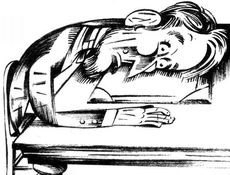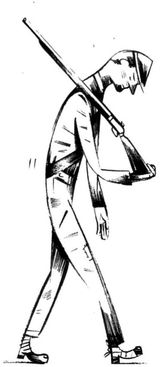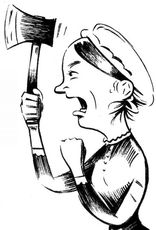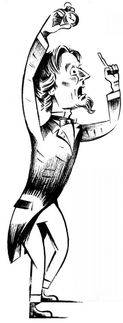Two Miserable Presidents (16 page)
Read Two Miserable Presidents Online
Authors: Steve Sheinkin

Was the South ready to quit fighting after those painful losses at Gettysburg and Vicksburg? Not even close. Southern spirit was still strongâas you can see from these questions in a math textbook used by Southern students during the war:
1. A Confederate soldier captured eight Yankees each day for nine days. How many Yankees did he capture in all?
2. If one Confederate soldier can whip seven Yankees, how many Confederate soldiers can whip forty-nine Yankees?
No, the South was nowhere near ready to give up.

T
oday we think of the Union victories at Gettysburg and Vicksburg as the major turning point of the Civil War. After these battles the South would never again be strong enough to invade the North. But in July of 1863, Abraham Lincoln had no way of knowing this. In July of 1863, these Union victories were just another reason for Lincoln to get depressed.
oday we think of the Union victories at Gettysburg and Vicksburg as the major turning point of the Civil War. After these battles the South would never again be strong enough to invade the North. But in July of 1863, Abraham Lincoln had no way of knowing this. In July of 1863, these Union victories were just another reason for Lincoln to get depressed.
You'll recall that the Union army under General George Meade had just beaten Robert E. Lee's army at Gettysburg. Now Lee's armyâwhat was left of itâwas limping home like a wounded animal. If Lee could get safely back to Virginia, his army would have time to rest and recover. But if Meade attacked right away, he might be able to crush Lee once and for all.
Meade was cautious by nature, though. Plus, his army was still exhausted from the three-day Gettysburg fight. Lincoln urged Meade to get on with the attack. But this only annoyed Meade; it didn't make him move. (Meade was so easily annoyed that soldiers called him “Old Snapping Turtle.”)
Lincoln spent the next few days looking over maps, pacing impatiently, longing for news. Finally, on July 12, Meade declared that he was nearly ready to attack. Too lateâthe next night, Lee's army escaped across the Potomac River into Virginia. Lincoln was sick with disappointment. “We had them in our grasp.” he said. “We had only to stretch forth our hands and they were ours. And nothing I could say or do could make the army move.”
Now there was no end in sight. Just the thought of how much work lay ahead made Lincoln drop his head onto his desk and shut his eyes. “I'm a tired man,” he groaned. “Sometimes I'm the tiredest man on earth.”
R
obert E. Lee's soldiers might disagree. In their rush to escape from Gettysburg, they marched night and day through sticky mud and nonstop rain. “For ninety-six hours we were almost constantly on our feet,” one soldier remembered. “There was no time to cook rations and the boys went on about two biscuits and no meat a day.”
obert E. Lee's soldiers might disagree. In their rush to escape from Gettysburg, they marched night and day through sticky mud and nonstop rain. “For ninety-six hours we were almost constantly on our feet,” one soldier remembered. “There was no time to cook rations and the boys went on about two biscuits and no meat a day.”
“The whole of the army was dozing while marching,” another soldier said.
And those were the lucky ones. The unlucky ones were the wounded, who were loaded into wagons that bounced and rattled over rough roads. The wounded men suffered unbearable pain as their blood-soaked clothes dried, hardened, and poked into their open wounds. Horrible cries were heard coming from these wagons.
“Will no one have mercy and kill me?” shouted one wounded soldier.
Another yelled: “Stop! Oh! For God's sake, stop just for one minute; take me out and leave me to die on the roadside!”

General Lee himself was exhausted, sick, and desperately in need of some time off. Once back in Virginia, he actually wrote to Jefferson Davis suggesting that Davis find a new commander for the army. “I sensibly feel the growing failure of my bodily strength,” Lee told Davis. “I cannot even accomplish what I myself desire. How can I fulfill the expectations of others?”
Davis refused to even consider this request. “Our country could not bear to lose you,” Davis wrote to Lee. “Take all possible care of yourself.”
But who was going to take care of Davis? The war was going badly, and the never-ending stress was making his headaches worseâcausing explosions of pain in his face and blinding his left eye. Southern newspapers and members of Congress blamed Davis for everything that was going wrong. (And they were pretty cruel too: one Southern leader called Davis “miserable, stupid” and “one-eyed.”)
When they weren't insulting Davis, many members of the Confederate Congress were busy attacking each otherâand I do mean attacking. During one heated debate, Senator Benjamin Hill threw an ink bottle at Senator William Yancey, ripping open Yancey's cheek. Henry Foote was known to assault fellow members of Congress with a variety of weapons, including a pistol, a knife, and an umbrella.
And there was more bad news for Jefferson Davis. The women of Richmond were rioting!
T
he cause of the riot was simple: many families were starving. Two years of roaring battles had destroyed farms throughout the South. And there was very little money to buy imported food, because Southern farmers were unable to export their cotton to Europe. Europeans wanted to buy the cotton, but Southern ships couldn't get it thereâUnion warships were blockading almost every Southern port.
he cause of the riot was simple: many families were starving. Two years of roaring battles had destroyed farms throughout the South. And there was very little money to buy imported food, because Southern farmers were unable to export their cotton to Europe. Europeans wanted to buy the cotton, but Southern ships couldn't get it thereâUnion warships were blockading almost every Southern port.
As a result, fresh food was scarce. The prices of basic items such as flour, corn, and meat were rising out of control. When a woman walked into a store in Richmond and asked the price of a barrel of flour, the merchant demanded seventy dollars. That led to this exchange:
Woman:
My God! How can I pay such prices? I have seven children; what shall I do?
My God! How can I pay such prices? I have seven children; what shall I do?
Merchant:
I don't know madam, unless you eat your children.
I don't know madam, unless you eat your children.
The soaring cost of food sparked riots in more than a dozen Southern cities. In Atlanta, women with knives and guns entered shops and asked the price of goods they needed. If they felt the prices were unfairly high, they simply took the food home to their families.
In Richmond, a thirty-seven-year-old mother of four named Mary Jackson led the largest of these “bread riots.” The Richmond Bread Riot began when a crowd of several hundred women surrounded Jackson, cheering her demands for fair prices. Then they followed her through the streets, smashing store windows, grabbing goods, and chanting, “Bread! Bread! Bread!”
“Some had hatchets and axes,” one witness said. “Some clubs, some knives, and many carried bayonets in their belts.”
When asked why she had joined the angry mob, an eighteen-year-old woman explained:
“We are starving. We are going to the bakeries and each of us will take a loaf of bread. That is little enough for the government to give us after it has taken all our men.”

Jefferson Davis ran out into the street, jumped onto a wagon, and told the rioters to go home. The people responded with boos and hisses. Davis pulled some coins from his pockets and threw them to the crowd. “Here is all I have,” he told them. “It is not much, but take it!” This didn't seem to help.
Then Davis got serious. In five minutes, he warned, soldiers would begin firing at the crowd. He pulled out his pocket watch and counted off one minute, then two, three, four ⦠No one moved.
Davis held up the watch and shouted:

“
My friends, you have one minute more!
”
My friends, you have one minute more!
”
That did itâthe people went home, muttering and still hungry.
Meanwhile, up North, a much more serious riot was about to explode.
O
n the morning of July 13, 1863, Martha Perry was sitting in her New York City apartment when she was startled by a burst of noise in the street below. “I heard loud and continued cheers,” she later wrote, “and supposed it must be news of some great victory.”
n the morning of July 13, 1863, Martha Perry was sitting in her New York City apartment when she was startled by a burst of noise in the street below. “I heard loud and continued cheers,” she later wrote, “and supposed it must be news of some great victory.”
She quickly realized how wrong she was. “I flew to my window,” she said, “and saw rushing up Lexington Avenue, within a few paces of our house, a great mob of men, women and children. The men, in red working shirts, looking
fairly fiendish as they brandished clubs, threw stones, and fired pistols. Many of the women had babies in their arms, and all of them were completely lawless as they swept on.”
fairly fiendish as they brandished clubs, threw stones, and fired pistols. Many of the women had babies in their arms, and all of them were completely lawless as they swept on.”
This was the start of the New York City Draft Riotsâthe biggest and most violent riots in the history of the United States.
The trouble had begun in March 1863, when the government announced that it would begin drafting men into the Union army. This sparked anger for many reasons. Plenty of people were already sick of war and simply did not want to get shot at. Many were also furious about an incredibly bogus part of the draft law. If you were drafted, the law said, you could get out of serving by paying the government three hundred dollars. This was easy for a rich man to do, but it took the average worker about a year to earn three hundred dollars! This led to a protest cry: “A rich man's war and a poor man's fight!”
There was another, uglier reason for the draft protestsâracial prejudice. Since Lincoln's Emancipation Proclamation, people realized that the North was fighting to preserve the Union and to end slavery. Many white workers wondered, Why should we risk our lives to help African Americans? Freed slaves will just come to the North and compete with us for jobs.
When the draft began in New York City, furious workers marched to the government office where the draft was taking place. Inside the office, a blindfolded government worker was quietly drafting soldiers by pulling names from a large spinning wheel. Outside, a mob was shouting and waving clubs and pulling up bricks and stones from the street. Then the anger erupted as the mob smashed the office windows, charged inside, and started destroying everything in sight.
The draft riots raged out of control for the next three days. Mobs of thousands attacked and burned government offices, police stations, and newspapers that supported President Lincoln. The city glowed
red at night as fires burned everywhere and rioters chanted:
red at night as fires burned everywhere and rioters chanted:
“No draft!”
“The poor man's blood for the rich man's money!”
“Tell Old Abe to come to New York!”
Rioters attacked policemen, anyone who looked rich, and African Americans. Several black men were beaten to death. One mob even attacked an orphanage for African American children. Two hundred children escaped out the back as the cursing crowd set fire to the building.
Union soldiers rushed to New York from the battle of Gettysburg and finally ended the riotsâby firing into the raging crowds. More than a hundred people were killed in the draft riots.
Down in Washington, Abraham Lincoln said he felt as if he were sitting on a volcano.
Other books
Bound to the Pack (Bound to the Pack, #1) by Morelle, Sonja
U.G.L.Y by Rhoades, H. A.
Necessary Heartbreak by Michael J. Sullivan
Gimme a Call by Sarah Mlynowski
Love Wears A Stetson "Wyatt" by Beck, Anne Marie
Dissident by Cecilia London
A Dangerous Path by Erin Hunter
All the Difference by Leah Ferguson
Unbreakable by Emma Scott
Sparkle: The Queerest Book You'll Ever Love by Rosen, Rob
